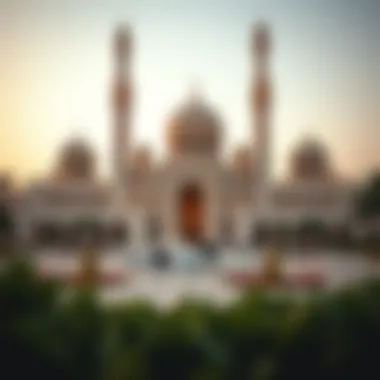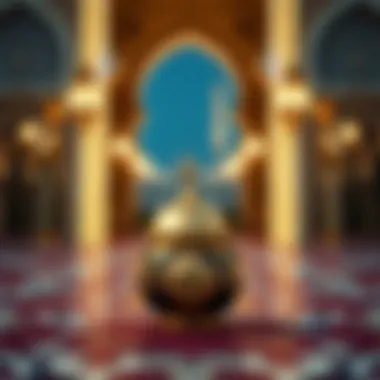Ramadan 2023 Timing in Dubai: A Detailed Guide


Intro
As the sun begins to set on the horizon of Dubai, a palpable transformation occurs across the city. Ramadan, the holy month observed by millions worldwide, holds a distinct significance in the cultural tapestry of Dubai. More than just a time of fasting and reflection, it intertwines with the city's unique lifestyle and communal spirit, creating a backdrop that is both enriching and challenging for residents and visitors alike. This guide aims to navigate the intricate layers of Ramadan 2023—focused on its timing, rituals, and the daily life impact in this vibrant metropolis.
In the coming sections, we will explore the timing intricacies of Ramadan 2023, the traditional practices that shape the month, and the cultural implications that resonate across the diverse neighborhoods of Dubai. Whether you're an investor eying potential opportunities or a newcomer eager to immerse in local customs, understanding the fabric of this month's significance is crucial.
Market Trends and Analysis
Current Market Overview
Not only does Ramadan represent a spiritual journey, but it also has profound effects on the local real estate market and economy. During this month, there's often a noticeable shift in consumer spending, leading to adjustments in market trends. Food and beverage sectors experience a surge in demand, while real estate spaces that accommodate Iftar gatherings and community events often see increased foot traffic.
This unique intersection of faith and commerce creates a dynamic marketplace. Local businesses, especially those in hospitality, tend to thrive, indicating a positive ripple effect on property values in popular areas. Projects that align with the community's values and lifestyle choices also become attractive investments.
Future Market Predictions
Looking ahead, the market in Dubai exhibits resilience and adaptability, especially as Ramadan approaches. With trends indicating a steady influx of expatriates and investors opting for Dubai as a base, we can anticipate a more extensive range of developments targeting these demographics. Areas with historical significance during Ramadan, like Deira and Bur Dubai, are making a marked return in popularity.
"Ramadan is not just a month, it's a lens through which we view cultural evolution in Dubai, shaping community interactions and investments alike."
The future holds potential for mixed-use developments that marry residential living with spaces for Ramadan-related activities. Such investments are likely to appeal to investors looking for opportunities that resonate with the local population while catering to those seeking a genuine Dubai experience.
Investment Opportunities
Emerging Neighborhoods
As traditional hotspots continue to evolve, certain neighborhoods stand out as promising options for investment during Ramadan and beyond. Areas like Dubai Marina and Downtown Dubai remain stalwarts due to their vibrancy, but emerging neighborhoods like Dubai Creek Harbour and Al Quoz offer unique advantages that align with Ramadan's values—community connection and cultural experiences. These districts provide innovative living spaces that cater to modern needs while fostering a sense of belonging.
Types of Properties for Investment
When considering investments, several property types become particularly relevant during the holy month:
- Residential Properties: Apartment complexes with community amenities often attract families looking for a holistic living experience.
- Commercial Spaces: Restaurants and cafes focusing on Iftar menus or traditional offerings thrive during Ramadan, making them lucrative ventures.
- Mixed-Use Developments: Properties that integrate living spaces with retail and leisure options are ideal, as they create an ecosystem that supports both residents and businesses.
By focusing on these burgeoning neighborhoods and property types, investors can position themselves advantageously in Dubai's evolving landscape.
Dive deeper into the essence of Ramadan 2023 and its broader implications in our following sections. Understanding these nuances will not only enhance your experience but also open doors to potential opportunities—both personal and professional.
Understanding the Islamic Calendar
The Islamic calendar holds a pivotal role in the lives of Muslims worldwide, as it dictates the timing of religious observances and cultural events. Ramadan, a month dedicated to fasting, prayer, and reflection, is determined by this calendar. Understanding its intricacies helps individuals and communities mark the sacred month appropriately, ensuring that they partake in its spiritual aspects and communal gatherings.
At its core, the Islamic calendar is based on lunar cycles, differing from the Gregorian calendar most people are familiar with. Each month of the Hijri calendar is either 29 or 30 days long, depending on the sighting of the moon. This cyclical nature creates a fluidity in the calendar, causing Islamic months to shift from one season to another over the years. As such, every year, Ramadan, the ninth month of the Islamic calendar, arrives on different Gregorian dates.
The navigation of this calendar becomes especially significant as it relates to the timing of special occasions, including Ramadan. Knowing when Ramadan begins and ends assists Muslims in preparing both spiritually and practically. Families can plan their meals, work schedules, and community events, ensuring they make the most of this holy time.
Additionally, gaining insight into the Hijri months enriches one’s appreciation of cultural and religious traditions inherent during this period.
The Lunar Cycle
The lunar cycle, comprising approximately 29.5 days, is the heart of the Islamic calendar. This cycle influences all aspects of the calendar, including determining the start and end of Ramadan each year. Each new month begins with the sighting of the crescent moon, also known as "hilal." After years of experience, many communities develop their own methods of moon sighting, blending scientific observation with traditional practices.
By understanding this lunar pattern, individuals not only grasp when Ramadan will commence but also gain insights into the broader cultural and religious observances that take place throughout the year. For example, festivals like Eid al-Fitr and Eid al-Adha are greatly affected by the lunar calendar's shifting nature, affecting the dates of celebration.
Thus, appreciating the lunar cycle is not just about keeping track of time; it’s a pathway into the deeper significance of Islamic observations and cultural practices.
Significance of Hijri Months
The Hijri months carry layers of meaning and significance, particularly during Ramadan. Each month has its themes and preferred deeds, allowing Muslims to engage in varying acts of worship and piety.
- Muharram - A month of reflection and mourning, especially for Shia Muslims, who observe the martyrdom of Imam Hussein.
- Rajab - Associated with the ascension of the Prophet Muhammad, it is a time for prayer and spiritual preparation.
- Ramadan - The most revered month, it’s a period of fasting, introspection, and community connection.
- Shawwal - The month that follows Ramadan, marked by the celebration of Eid al-Fitr, signifies joy and gratitude for the completed fast.
Each month further enriches the faith of practitioners, influencing their actions, decisions, and social interactions. For a community like Dubai, where growth and progress coalesce with tradition, understanding these months becomes essential in nurturing both personal and communal identities during significant times like Ramadan.
Incorporating awareness of the Islamic calendar can lead to more meaningful participation in community events, a deeper connection to spirituality, and a clearer understanding of the rhythms of life in a place with a diverse population. As Ramadan approaches, reflecting on these aspects prepares us for what's ahead.
The Arrival of Ramadan in


The arrival of Ramadan marks a period of profound significance for Muslims around the globe, and in Dubai, this annual event is not merely a religious observance; it is woven into the very fabric of societal interaction and community bonding. Understanding its timing is essential for residents and newcomers alike, providing insights into how the calendar shapes daily routines, commerce, and social gatherings.
In 2023, Ramadan is expected to commence in the evening of March 23 and conclude with Eid al-Fitr on the evening of April 21. These dates rely on the sighting of the moon, adapting yearly fluctuations that can shift the starting point by a day or two. Thus, keeping an eye on local astronomical announcements can be beneficial for planning purposes, whether for attending iftar dinners or scheduling work commitments.
Expected Start and End Dates
The expected dates, as mentioned, are determined largely by lunar phases. These lunar months typically last about 29 or 30 days based on the sighting of the moon. In 2023, Muslims in Dubai will probably observe their first fast on March 24 and break it on April 21.
It’s important to note that these dates can be influenced by numerous factors, including geographical location and local customs regarding moon sightings.
- Start Date: March 24, 2023 (tentative)
- End Date: April 21, 2023 (tentative)
Whenever discussing Ramadan timing, it is crucial to remember that community and family gatherings are an intrinsic part of the month. People in Dubai often come together for iftar, the meal to break the fast, highlighting the communal spirit. This is not just about the dates; it’s about the fellowship, charity, and spiritual renewal that accompany this holy month.
Factors Influencing Timing
Several factors can influence the timing of Ramadan, some of which are practical while others are cultural or religious in nature:
- Lunar Observations: The Islamic calendar is strictly lunar, causing Ramadan to shift by around 10-12 days earlier each year compared to the Gregorian calendar.
- Local Customs: Different Islamic regions might follow varying traditions regarding moon sighting, which can affect the start of Ramadan. In Dubai, Islamic authorities often provide official announcements based on these observations.
- Technological Updates: With advancements in astronomy, predictions have become increasingly accurate. Many UAE citizens may refer to apps or websites that offer moon phase updates, but the final word usually rests with religious authorities.
- Social Considerations: Various cultural and familial traditions shape how individuals anticipate and prepare for Ramadan. Many locals start adjusting their sleep and meal schedules well ahead of the month, regardless of the exact start date.
- Government Regulations: Within Dubai, regulations regarding public conduct during the fasting month can also influence how soon companies might announce changes in work hours or schedules.
Understanding these factors not only enhances the anticipation of Ramadan but ensures that people can make the most of this cherished time. Whether for the communal iftars, heightened spirituality, or the shared acts of charity, grasping the timing of Ramadan is key to experiencing its full significance.
Cultural Practices During Ramadan
Cultural practices during Ramadan hold significant importance for Muslims in Dubai, intertwining sacred rituals with local customs. These practices foster a sense of community, solidarity, and shared identity, enriching the spiritual experience of fasting. Engaging in these traditions goes beyond personal devotion; they bring families and friends together, enhancing bonds that might sometimes get lost in the hustle of urban life.
Key Aspects of Cultural Practices:
- Community Engagement: Ramadan is not solely an individual journey; it's a collective experience. People gather for prayers, share meals, and participate in community events, reinforcing the communal spirit.
- Emphasis on Charity: The act of giving is central to Ramadan. Families often prepare meals for those in need, showcasing the importance of compassion and support.
- Culinary Traditions: Each day of fasting concludes with iftar, the breaking of the fast. Food becomes a medium for cultural expression, with many families passing down recipes through generations, making gatherings even more meaningful.
- Countdown to Eid: The festive mood builds as Ramadan progresses, culminating in Eid al-Fitr celebrations, marking the end of fasting with joy, feasts, and continued acts of kindness.
Traditional Iftar Gatherings
Iftar gatherings are perhaps the most vibrant feature of Ramadan in Dubai. As the sun sets, families, friends, and sometimes complete strangers come together to share a meal that breaks the day-long fast. The atmosphere is filled with warmth, laughter, and gratitude.
- Feasting on Local Delicacies: Traditional dishes such as harees, thareed, and luqaimat are commonly served, often bringing a hint of nostalgia and local flavor to the table. Each bite resonates with shared memories and cultural pride.
- Community Events: Many locals organize large iftar events in public spaces, allowing complete strangers to join in the festivities. This is not merely an act of hospitality; it serves to bridge gaps between diverse cultures in a cosmopolitan city like Dubai.
- Health and Wellness Considerations: While the joy of feasting presents an opportunity to enjoy culinary delights, there’s often an emphasis on balanced meals that honor health. Overindulgence is generally avoided, aligning culinary choices with the spiritual aspect of Ramadan.
Significance of Suhoor
The pre-dawn meal known as suhoor holds equal importance to iftar. As the last meal before fasting begins, it sets the tone for the day and has profound implications for one’s physical and spiritual endurance during Ramadan.
- Fueling the Fast: Suhoor is not just a meal; it’s a strategy for sustaining energy and strength throughout the day of fasting. Foods rich in fiber, protein, and hydration are often prioritized, aiding in sustaining energy levels and minimizing discomfort.
- Spiritual Preparation: Consuming suhoor also carries a spiritual significance, as it represents the readiness to embark on a day of devotion and self-restraint. It acts as a reminder of the discipline and mental fortitude required during this sacred month.
- Cultural Connections: In Dubai, suhoor may feature communal elements, where families and friends gather before dawn. It fosters a sense of togetherness and shared commitment to the spiritual path of Ramadan.
As the city prepares for the holy month, these cultural practices shape the societal landscape, enhancing the experience for both long-time residents and newcomers alike. Embracing these traditions offers a deeper understanding of the values that resonate within the community, extending an invitation to participate in the rich tapestry of life's meaning during this holy season of fasting.
Daily Life Adjustments During Ramadan
During the holy month of Ramadan, the daily routines of individuals in Dubai, along with the broader community as a whole, shift in significant ways. It’s not just about fasting from dawn until dusk; it’s a time when work hours adjust, schools modify their schedules, and social customs evolve to accommodate the Ramadan spirit. Understanding these changes can help both locals and newcomers navigate through this period smoothly.
Workplace Adaptations
In Dubai, many organizations embrace a flexible approach during Ramadan. This period often comes loaded with workplace adaptations aimed at fostering a respectful environment for fasting employees.
Reduced Work Hours
Many businesses opt to shorten their working hours. For example, the standard workweek might shift from eight hours to six. This adjustment allows employees to manage their energy levels better, ensuring they remain productive while also catering to their health needs during fasting. Most government offices typically operate from 9 AM to 2 PM, which provides an ample window to accommodate evening prayers and iftar meals.
Flexible Scheduling
Employers frequently offer flexible scheduling, permitting employees to start and end their workday earlier. Companies that value employee well-being might even consider allowing remote work, so long as it meets operational needs. This shift supports workers in achieving a better work-life balance and allows them to observe personal rituals unencumbered.
Cultural Sensitivity Training
To cultivate an understanding and inclusive atmosphere, some businesses may implement cultural sensitivity training to educate non-Muslim employees about Ramadan. This can foster an empathetic environment, helping employees appreciate the significance of fasting and the values inherent during this month. Working together and showing support can create a positive and unifying workplace culture during this time.
School Schedules
Ramadan also brings noticeable adjustments to school schedules and routines. This can profoundly impact students, parents, and educators alike.
Modified School Hours


Schools typically adapt their hours to suit the needs of families observing Ramadan. Educational institutions often shift their start times to later in the morning. This enables students to rest properly after suhoor, the pre-dawn meal. Classes may begin around 9 AM and conclude around 1 PM, allowing enough time for students to transition to iftar.
Curriculum Adjustments
Curriculum shifts can occur as schools may prioritize less intensive subjects during this time. Activities can lean more towards cultural education and encourage discussions about Ramadan’s significance. Teachers might introduce projects that focus on community service, charity, or other values aligned with the spirit of the month. Such approaches unite students and enhance their understanding of the broader world around them.
Extracurricular Activities
Most schools also change their extracurricular schedules to respect the fasting times. Sports and physical activities may be curtailed or entirely postponed until after iftar to ensure students are not exerting themselves while fasting. This adjustment emphasizes both health and safety for school-age kids during Ramadan.
In summary, Ramadan significantly influences daily life in Dubai. From workplace adaptations to modified school schedules, understanding these adjustments is crucial for thriving during the holy month. Navigating these changes helps ease the transition and create a harmonious environment that’s conducive to focus on spiritual growth and community bonding.
Local Regulations and Guidelines
Understanding local regulations and guidelines during Ramadan is crucial for everyone in Dubai, from long-time residents to newcomers. This period is not just about fasting; it encompasses a set of rules that govern public behavior, workplace conduct, and community interactions. These guidelines foster respect and harmony within the diverse population of the city, ensuring that the essence of Ramadan is upheld in both personal and collective practices.
Fasting and Conduct Guidelines
Fasting during Ramadan is an act of devotion but also comes with a clear set of conduct guidelines that must be adhered to. The city enforces these rules strictly, considering the religious and cultural significance of the month.
- Mandatory Fasting: Muslims are required to abstain from food, drink, and other physical needs from dawn to sunset. While this is a personal commitment, it is also a public expectation. Non-Muslims are expected to respect this by refraining from eating or drinking in public during fasting hours.
- Behavioral Expectations: In a diverse city like Dubai, showing respect during Ramadan transcends just refraining from eating and drinking; it extends to overall behavior. People are advised to avoid engaging loudly in public or demonstrating any form of disrespect towards individuals who are fasting.
Compliance with these guidelines not only showcases cultural sensitivity but also cultivates an environment of respect and unity in a multicultural setting such as Dubai.
- Exceptions to Fasting: There are specific exemptions to fasting for those who are ill, pregnant, or nursing. These exceptions are important to note, as they give individuals the flexibility to observe Ramadan in a manner that suits their circumstances while still participating in community events.
Public Behavior Adjustments
With the commencement of Ramadan, the social fabric of Dubai shifts slightly, necessitating adjustments in public behavior. Understanding these nuances is essential for a smooth experience:
- Dress Code: While Dubai generally promotes a liberal lifestyle, during Ramadan, dressing modestly becomes even more critical. Residents and visitors alike are encouraged to wear clothing that respects the cultural context, avoiding overly revealing outfits.
- Kindness and Patience: Ramadan is a time of giving and kindness. There is a notable increase in charitable activities and community events which calls for patience and understanding in all interactions. The spirit of the holy month is about compassion, and this should reflect in how individuals interact with one another.
- Traffic and Gatherings: As if on cue, traffic patterns may change with more families attempting to gather for iftar dinners, the meal breaking the fast. It's advisable to plan travel accordingly and be prepared for potential delays.
In summary, adhering to local regulations and adjusting public behavior during Ramadan in Dubai not only shows respect to the traditions of the Islamic community but also enriches personal experiences of cultural engagement and mutual respect. Understanding these elements helps everyone navigate this significant time with grace and appreciation.
Business Impact During Ramadan
The month of Ramadan holds a unique significance not just for those observing the fast, but also for the overall business landscape in Dubai. Understanding how this sacred time affects various sectors is essential for investors, homeowners, expatriates, real estate agents, and analysts alike. The influx of cultural practices, shifts in consumer behavior, and changes in work schedules create a vibrant yet complex market environment. Hence, this exploration into the business impact during Ramadan reveals both opportunities and challenges that stakeholders must navigate.
Retail Sector Changes
Retail businesses see a dynamic transformation during Ramadan. It's a period where consumer spending patterns shift dramatically due to changing lifestyles. Most notably, the inclination towards larger family gatherings and social events inspires heightened demand for specific product categories. For instance, food retailers often prepare for a significant uptick in sales of dates, sweets, and a variety of traditional dishes designed for iftar.
- Increased Sales: Not only are basic necessities in demand, but luxury goods also take center stage as people often gift items to family and friends.
- Promotions and Discounts: Many retailers introduce special Ramadan promotions to attract shoppers looking for deals. This strategy not only boosts sales but also strengthens customer loyalty.
- Extended Store Hours: Recognizing that shopping habits shift during Ramadan nights, many retail outlets extend their hours, allowing more flexibility for evening shoppers.
Moreover, the spirit of community service often encourages local businesses to engage in charitable acts, enhancing their brand image and reinforcing customer relationships. As such, Ramadan becomes not just about profits; it's also a time for businesses to showcase their commitment to society.
Real Estate Market Dynamics
The real estate market in Dubai also feels the pulse of Ramadan. This period can influence buyer behavior and investment sentiments in various ways. For instance, individuals often prioritize family-oriented living spaces during this month, as communal gatherings become a focal point of celebration.
- Increased Demand for Larger Homes: As families come together to break their fast, there's usually a spike in demand for larger apartments or villas that can accommodate gatherings.
- Investment Opportunities: Investors may see Ramadan as a strategic time to explore properties that cater to families seeking space for entertainment and hospitality.
- Cultural Events Driving Foot Traffic: With a host of cultural events and activities organized in many neighborhoods, properties located near these festivities often witness increased interest.
"Understanding the shift in consumer preferences and housing needs during Ramadan can guide better strategies for real estate investments and marketing efforts.”
Festive Events and Activities
Ramadan is not just a time of fasting; it holds a social and communal significance that nurtures bonds among family, friends, and the broader community. The variety of festive events and activities during this holy month bring a unique flavor to Dubai's cosmopolitan scene. These events embody the spirit of togetherness, allowing individuals and families to engage meaningfully with others, appreciate cultural diversity, and reflect on personal growth.
Cultural Events During Ramadan
During Ramadan, cultural events blossom like flowers in spring, showcasing the rich heritage and traditions of Islam. You'll find a mixture of activities that cater to the diverse community in Dubai, from art exhibitions to poetry readings. Many galleries, like the Alserkal Avenue, feature special events that focus on Islamic art and philosophy. These exhibitions don’t just highlight the beauty of the works but also serve as a platform for community dialogue and education.
Craft workshops often take center stage, allowing both locals and expatriates to learn traditional skills such as calligraphy and pottery. This cultural exchange fosters appreciation and respect, making it a win-win for everyone involved. Moreover, storytelling nights in local cafes attract families and individuals alike, creating an atmosphere where cultural narratives flow freely, encouraging deeper connections.
Outdoor Festivals
As the sun sets and the evening air cools down, outdoor festivals light up the city. These events transform public spaces into vibrant cultural hubs, replete with food stalls, entertainment, and engaging activities for all ages. The Dubai Marina and Jumeirah Beach become hotspots for families looking to soak in the festive spirit.


Food is a major attraction during these outdoor gatherings. Local vendors offer a range of traditional dishes such as shawarma, falafel, and dates, inviting both residents and tourists to savor the unique flavors of the region. Expect lively music, dance performances, and even cinematic screenings under the stars. These outdoor experiences are designed not just for enjoyment but also to foster connections within the community, as families and friends gather to share stories, laughter, and lots of delicious food.
Ramadan is about building bridges, not just through spiritual practices but also through celebration and community. Engaging in these festive events allows individuals to forge meaningful connections while experiencing the rich tapestry of cultures that make up Dubai.
In short, festive events and activities during Ramadan enhance the joyous spirit of the month, promoting unity and understanding among all communities.
By fully participating in these events, whether through attending outdoor festivals or engaging in cultural activities, everyone can contribute to the beautiful communal experience the holy month of Ramadan offers.
Health Considerations During Fasting
Fasting during Ramadan is not just a physical act; it's an opportunity for spiritual rejuvenation and reflection. However, maintaining good health while observing the fast is pivotal, especially given the challenges posed by the extended hours without food or drink. Here, we outline the essentials to ensure that both your body and mind are well-prepared throughout the month.
Nutritional Advice
Successful fasting hinges significantly on the types of foods consumed during suhoor and iftar. Ensuring a balanced diet can make a world of difference in managing energy levels and overall wellbeing. Here are some nutritional tips to consider:
- Emphasize Whole Foods: Incorporate whole grains like brown rice or whole wheat bread, which provide slow-releasing carbohydrates that sustain energy throughout the day.
- Fruits and Vegetables: These are rich in vitamins, minerals, and fibers. They help combat fatigue, boost the immune system, and can assist with hydration. Water-rich fruits such as watermelon and oranges are particularly beneficial.
- Lean Proteins: Opt for chicken, turkey, or fatty fish like salmon. These proteins can help maintain muscle mass and offer essential nutrients without weighing you down.
- Limit Sugars and Processed Foods: Avoiding sugary snacks and drinks can help prevent energy spikes followed by crashes, keeping energy levels more stable.
- Include Healthy Fats: Nuts, seeds, and avocados are excellent sources of healthy fats that provide prolonged energy and enhance satiety.
Adhering to these nutritional guidelines can make your fasting experience more manageable and help maintain your strength and focus.
Hydration Tips
Staying hydrated is crucial during Ramadan, particularly in a region like Dubai where temperatures can soar. Dehydration can lead to fatigue and headaches, reducing both productivity and the enjoyment of the Ramadan experience. Here are some primary hydration tips to incorporate into your routine:
- Drink Plenty of Water: Aim for at least 8-10 glasses of water between iftar and suhoor. Gradually sip water rather than chugging it down to maximize absorption and reduce the chance of gastrointestinal discomfort.
- Avoid Caffeine and Sugary Drinks: Caffeine can lead to increased fluid loss due to its diuretic properties. Similarly, sugary drinks can cause rapid spikes in energy followed by inevitable crashes, leaving you parched.
- Infuse Your Water: To add flavor without added sugars, try infusing your water with fruits like lemons, limes, or even herbs like mint. This can make hydration more enjoyable and less tedious.
- Monitor Your Activity Levels: Limit strenuous activities during the hottest parts of the day. Try to schedule workouts or physical exertions during cooler hours, as avoiding excessive sweating will help conserve bodily fluids.
By prioritizing hydration and following good nutritional practices, you can ensure that the observance of Ramadan is both spiritually enriching and healthily sustainable.
Spiritual Significance of Ramadan
Ramadan holds a deep-seated significance for Muslims around the globe. This holy month transcends mere abstention from food and drink; it invites individuals to embark on a profound journey of spiritual reflection, personal growth, and communal harmony. In a city like Dubai, where cultures intersect, the essence of Ramadan gains unique local dimensions, making it even more poignant.
Reflection and Personal Growth
During Ramadan, the focus shifts from daily tribulations to introspection. It's a time when the hustle and bustle of life takes a back seat, allowing individuals to step back and contemplate their spiritual path. Many articulate this period as a chance to reconnect with one’s faith and values.
Islam teaches that fasting teaches self-discipline and control over one’s desires. People often find themselves reflecting on their actions, considering how they could reach for better horizons. With the fast from sunrise to sunset, the act of hunger becomes a vehicle for empathy, reminding individuals of those less fortunate. The prayers and Quranic recitations enhance the overall experience, helping individuals delve deeper into understanding their purpose.
- Self-Reflection: It’s common for many to keep a journal during Ramadan. They jot down their thoughts, feelings, or even spiritual revelations that arise. Devotions and prayers are also amplified, often leading many to develop a deeper relationship with their Creator.
- Setting Goals: Individuals set intentions at the beginning of Ramadan; these may focus on personal growth, such as improving one’s character or overcoming negative habits. Each day unveils new challenges and opportunities for people to evaluate progress toward these goals.
Through these avenues, personal growth during Ramadan takes on a form that's both universal and exceptionally personal, allowing space for genuine transformation.
Acts of Charity and Community Support
Charity is a pillar of Islam and takes a front seat during Ramadan. Known as Zakat and Sadaqah, the acts of giving become especially potent in this month. Many Dubai residents embrace the spirit of giving, pooling resources to support those in need.
- Community Initiatives: Numerous community projects and food drives emerge, such as the Iftar Sharing Campaign, which provides meals to the less privileged especially during sunset prayers. Initiatives like these foster a sense of belonging while providing essential assistance.
- Empowering Local Charities: Engaging with local charitable organizations is a common practice during Ramadan. Residents reach out to groups like Dubai Cares or Emirates Red Crescent, contributing their time and money. This enhances community spirit and harnesses collective energy to tackle social issues.
- Acts of Kindness: Beyond organized charity, individuals practice small acts of kindness daily. From offering food to neighbors to simply sharing smiles in public spaces, these gestures create an environment where compassion thrives.
Ramadan emphasizes not just individual growth, but rather, the enhancement of the fabric that binds communities together. Uniting in purpose through acts of charity is a testament to the power of collective compassion.
In essence, the spiritual significance of Ramadan in Dubai transcends mere tradition. It becomes a canvas where individual reflections meld with community support, creating a rich tapestry that truly embodies the spirit of the month.
Epilogue on Ramadan Timing and Lifestyle in Dubai
As Ramadan unfolds each year, it brings a profound shift not only to the spiritual lives of Muslims but also to the very fabric of life in Dubai. The significance of this month extends beyond mere fasting; it encapsulates a unique blend of cultural traditions, social responsibilities, and economic intricacies that impact everyone, whether they are practicing Muslims or just residing in this vibrant city. This aspect makes understanding the timing and lifestyle adjustments during Ramadan vital for all who live and work in Dubai.
During this holy month in 2023, the adjustments that come with the timing of Ramadan are noteworthy. As the daily routine shifts, businesses and educational institutions adapt, reflecting the respect and recognition of this sacred period. The likelihood of working hours being shortened allows employees to participate in fasting, encouraging understanding among colleagues from different backgrounds. This collective adaptation helps bolster community ties, fostering an atmosphere of harmony and support.
Moreover, the communal practices during Ramadan, from Iftar gatherings to charitable acts, highlight the spirit of giving and togetherness. These rituals create a sense of belonging, bridging gaps between cultures and enhancing social cohesion. For investors, homeowners, and other stakeholders, being aware of these practices offers insights into community engagement, providing opportunities for businesses to target their services more effectively to fit the unique needs of this time.
As Ramadan approaches, it is also essential to consider the long-term implications of such timings and adjustments. The way Dubai embraces this month can influence urban planning, recreational event scheduling, and even marketing strategies within various sectors. Understanding these nuances not only enhances the overall experience during Ramadan but could also lead to beneficial outcomes in Dubai's real estate and lifestyle markets.
Summary of Key Points
- Timing Adjustments: Ramadan alters daily routines, necessitating shifts in work and school hours.
- Cultural Importance: The month promotes community and charity, impacting social dynamics.
- Business Strategies: Knowledge of Ramadan timing aids businesses in catering to the needs of the community effectively.
- Long-term Outlook: Understanding these shifts can influence future urban and economic planning in Dubai.
The Future of Ramadan Practices in Dubai
The future of Ramadan in Dubai looks promising. With an increasing expat population, the local culture continues to evolve, allowing a richer tapestry of traditions blended with new customs. As awareness around Ramadan practices expands beyond the Muslim community, there is a greater opportunity for inclusivity and understanding. It is likely that we will witness Dubai embrace even more diverse cultural expressions during this month, reflecting the globalized nature of the city.
Moreover, advancements in technology and online platforms are set to play a crucial role in how Ramadan is celebrated going forward. Live-streamed Iftar events, virtual charity initiatives, and even community discussions via social media can enhance the connection to the community, no matter where individuals find themselves.
On a broader scale, as global perspectives shift and societal values transform, the essence of Ramadan remains firmly rooted in spirituality and communal strengthening. It will be key for stakeholders to keep an eye on these evolving practices, as they not only shape the lifestyle in Dubai but also impact investment patterns, real estate development, and community relations.
In essence, understanding the timing and lifestyle adjustments during Ramadan offers invaluable insights that pave the way for a collective experience, continuing Dubai’s narrative as a cultural melting pot.







